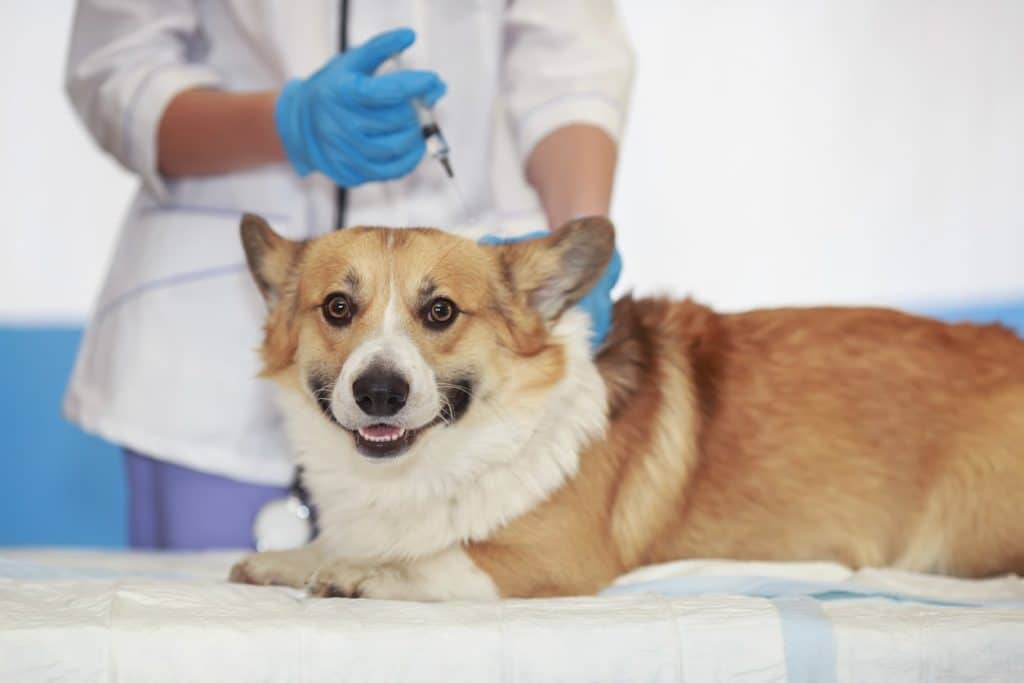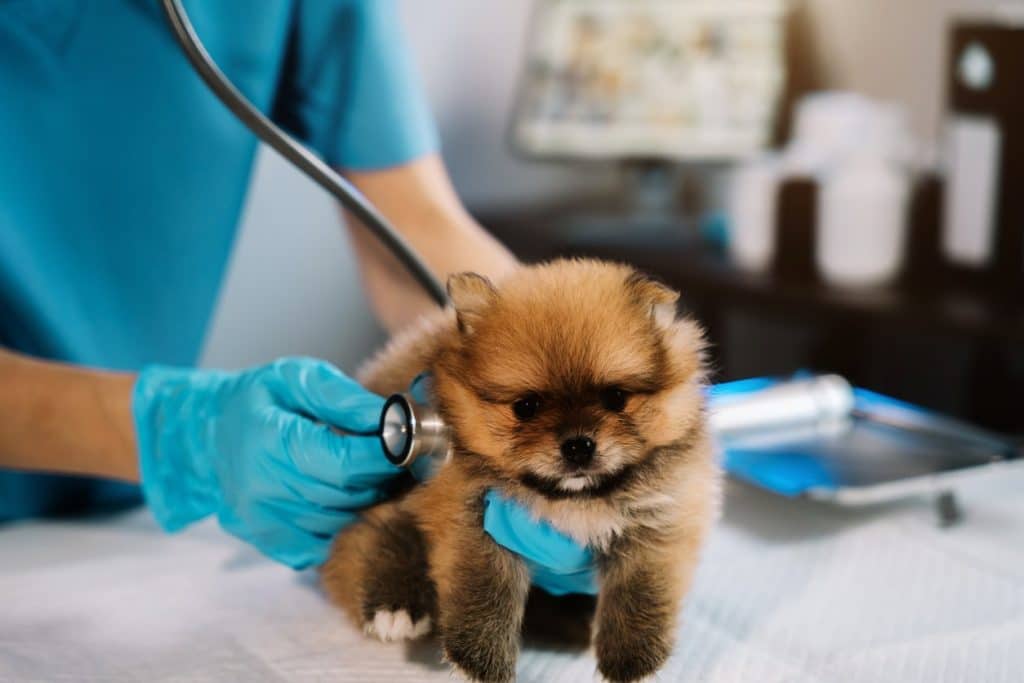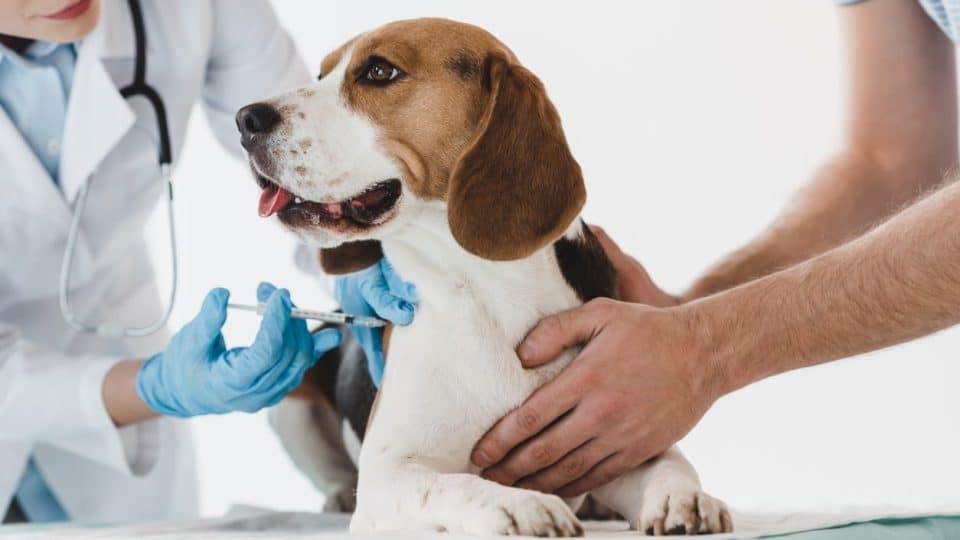- This article has been reviewed by a pet health professional. It is not a substitute for professional veterinary advice.
As you prepare for life with your new puppy, you might be surprised by the rigorous vaccination schedule. Puppies usually receive three to four rounds of vaccines in their first year, starting when they’re six to eight weeks old.
Once you start vaccinating your puppy, it’s important to stay on schedule. If your puppy’s immunity lapses, you might have to start the vaccine series again from the beginning, which can be time-consuming and expensive.
Here’s what you need to know about puppy shots, including which vaccines are essential and when to get them so your puppy stays healthy.
What Shots Do Puppies Need & When?
The table below offers a quick peek at a basic core puppy vaccination timeline based on British Small Animal Veterinary Association and World Small Animal Veterinary Association (WASAVA) guidelines. Most puppies in the UK require two initial sets of vaccinations two to four weeks apart, but some need a third. They will usually be protected one to three weeks after their completed primary course. Remember, vaccination frequency and schedules can vary depending on the type of vaccine used and your dog’s overall health. Your vet can advise on this.
| Required Vaccine | Puppy Age | Timeline After Initial Puppy Rounds |
| Distemper | 6-8 weeks, 10-12 weeks, 16-18 weeks (if third needed) | Every 1-3 years |
| Adenovirus 1 and 2 (hepatitis) | 6-8 weeks, 10-12 weeks, 16-18 weeks (if third needed) | Every 1-3 years |
| Parvovirus | 6-8 weeks, 10-12 weeks, 16-18 weeks (if third needed) | Every 1-3 years |
| Leptospirosis | 6-8 weeks, 10-12 weeks | Every year |
What Do Puppy Vaccines Protect Against?
Puppy vaccinations are split into two categories: core vaccines and non-core vaccines. “Core vaccines protect against highly contagious and potentially life-threatening diseases that are widespread and pose a significant risk,” explains Dr Mohamed Abouelkhair, a board-certified veterinary immunologist. These are the vaccines your new puppy will require.
Non-core vaccines are optional, and they’re typically based on your pet’s geographic location, lifestyle, and risk factors.
Core puppy vaccines
These shots will come first in a typical puppy vaccination schedule and are considered standard protocol for protecting your puppy here in the UK.
- Distemper. This contagious viral disease is spread through airborne exposure and shared food and water bowls. Distemper attacks a dog’s respiratory, nervous, and gastrointestinal (GI) systems. Because it’s incurable, preventative vaccination is critical.
- Parvovirus. Parvovirus attacks the gastrointestinal system, and scientists are still working to develop a cure. Fatal dehydration from the disease can occur within 72 hours, so infected dogs require immediate veterinary intervention.
- Adenovirus 1 and 2 (hepatitis). Canine hepatitis affects a dog’s liver, kidney, lungs, spleen, and eyes. If the disease progresses, it can be deadly. No cure exists, but symptoms can be managed by a vet.
- Leptospirosis. Usually found in contaminated water, leptospirosis is endemic throughout much of the continent. It’s also zoonotic (meaning it can be passed to humans) and can be life-threatening.
Combination vaccines covering all of the above core shots are widely available, and many also protect against canine parainfluenza. These are usually given incrementally as a puppy gets older, starting around six to eight weeks, and then given every three to four weeks until about 16 weeks old.
Here’s a sample schedule of what your puppy’s basic shot timeline might look like.
| Puppy Age | Vaccination Schedule |
| 6-8 weeks | Distemper, Adenovirus, Parvovirus, Leptospirosis |
| 10-12 weeks | Distemper, Adenovirus, Parvovirus, Leptospirosis |
| 16-18 weeks (if three vaccine rounds are needed) | Distemper, Adenovirus, Parvovirus, Leptospirosis |
| 12-16 months | Distemper, Adenovirus, Parvovirus, Leptospirosis |

iStock/Nataba
Non-core vaccines
Dr Abouelkhair recommends assessing non-core vaccines on an individual basis. Your vet will recommend these based on where you live, your puppy’s medical history, and other environmental factors. Non-core vaccines include:
- Bordetella. This is the most common bacterium that causes kennel cough. Dogs are most likely to encounter Bordetella when they’re in close quarters, such as at dog parks, boarding kennels, grooming facilities, and doggy day care.
- Parainfluenza. Parainfluenza is a highly contagious respiratory virus typically transmitted through contact with other dogs. It is another cause of kennel cough. Vaccination is highly recommended and often offered alongside core vaccinations or combined with them.
- Rabies. This virus attacks the nervous system and is usually transmitted through the bite of an infected animal. The disease is eradicated in the UK but any pets travelling outside of the country will require protection. If you are rehoming a dog from abroad, rabies vaccination is also mandatory.
- Canine influenza. The canine flu spreads easily from one dog to another. It’s rare in the UK and is not routinely vaccinated against. But the vaccine available protects dogs against two virus strains that cause the majority of cases: H3N8 and H3N2.
- Lyme disease. This is spread through ticks infected with the bacteria Borrelia burgdorferi. A vaccine for Lyme disease is available but tick prevention as part of routine parasite treatment is normally advised instead. This also helps to protect against other tick-borne viruses such as encephalitis and the rare disease canine babesiosis.
| Vaccine Name | Frequency |
| Bordetella | Puppies can get their initial shot (usually nasal drops) between six to eight weeks old, and then a booster four weeks later. After, low-risk dogs can get it annually, while high-risk dogs should get it every six months. |
| Canine Parainfluenza | Puppies can get their initial shot between six to eight weeks old, and then a booster four weeks later. A third shot can be required. After, low-risk dogs can get it annually. |
| Rabies | Puppies can be vaccinated from 12 weeks of age, with boosters every one to three years. |
| Canine influenza | Puppies can initially get this shot at 10-12 weeks old, followed by a booster two to four weeks later. Then, it can be given annually. |
| Lyme disease | Puppies can initially get this shot at 10-12 weeks old, followed by a booster two to four weeks later. Then, it can be given annually. |
How Much Do Vaccines Cost?
On average, puppy vaccinations will cost between £40 and £70. As your dog gets older, these upfront costs will diminish, as they will need less frequent vaccinations. Annual boosters usually cost about £50.
Prices for puppy vaccines can vary depending largely on your location. For example, if you live in a densely populated area, you may pay more for vaccinations than those in a rural setting.
While you may not be excited about these additional costs, vaccinations can save you in the long run. Not only do they protect your new family member against disease, but they also protect you from the costs of expensive treatments and medications should they get sick.
Luckily, there are low-cost options for vaccines. You may also be able to find affordable vaccinations through charities such as the PDSA and Blue Cross. You can also purchase pet insurance policy add-on wellness plans. (Remember, most pet insurance companies don’t cover routine visits and vaccines unless you are enrolled in their wellness or preventative health plan.)
Keeping Up With Vaccinations
Timely vaccinations are critical for developing your pup’s immunity, Dr Abouelkhair explains. Late or missed vaccinations can compromise your puppy’s health, leaving them susceptible to preventable diseases during a period of vulnerability.
“In some cases, catching up on missed vaccinations may require restarting the series, subjecting your puppy to unnecessary stress and cost,” he adds. For the best protection against disease, try to stick to your vet’s recommended puppy vaccination schedule.
The good news is, unvaccinated puppies can go outside—but take certain precautions. Avoid high-risk areas where other dogs are present. “While puppies can benefit from early socialisation, taking them to public places with unknown dogs before completing their vaccinations can expose them to diseases,” Dr Abouelkhair says.
Puppies can venture into your garden five to seven days after their first round of vaccinations, as long as your garden or lawn is well-maintained. At this stage, puppies can safely interact with other familiar dogs who are fully vaccinated.
Tips on protecting your dog before they have all their vaccines
- A dog backpack or carrier is an excellent way to socialise your dog to noises, people, and environments without risking bacterial or viral contamination.
- Only meet with dogs who have confirmed vaccination statuses.
- Avoid public parks or boarding your dog with other pets until they are up-to-date on vaccinations.
- Enroll in puppy training courses and camps where other similar-aged and protected dogs can play.
- Before your puppy goes outside, walk around and check that it’s free from potential hazards and animal waste.
Speak with your veterinarian about safe socialisation practices and the specific risks your local area may pose.

iStock/Thicha Satapitanon
Puppy Vaccine FAQs
Are puppy vaccine reactions common?
After a vaccination, some mild reactions are to be expected. “These reactions are generally short-lived and not cause for major concern,” Dr Abouelkhair assures. Additionally, he says your puppy may experience temporary redness or discomfort at the injection site, a slight fever, or reduced appetite. Usually, these side effects will only last 24-48 hours.
However, if your dog experiences a more serious allergic reaction or symptoms that won’t go away, notify your vet immediately. This is unlikely to occur, though.“Vaccine reactions are rare, and the benefits of vaccination greatly outweigh the potential risks,” Dr Abouelkhair says.
What happens if you miss a puppy shot?
This depends on how late you are on getting your puppy’s shot. Sometimes, a vet may determine they can give your puppy the doses they need, with fewer weeks in between, to catch up. Other times, you may need to restart the entire vaccine series.
How do I know if my dog is up to date on shots?
Dog breeders and shelters usually provide the initial round of shots before puppies go to their forever homes, but you’ll want to confirm this by asking for your puppy’s vaccination records.
If this information is unavailable or unknown, you’ll want to talk with your vet, who may be able to run a blood test (known as an antibody titer) on your pup to see if they’ve been previously vaccinated.
Is there different vaccination guidance for small-breed dogs?
Most of the time, core puppy vaccination schedules do not change for small, medium, and large breed dogs. However, non-core vaccine schedules can shift for smaller breed dogs, so it’s important to talk with your vet to determine what’s right for your pup.
Why does my vet have different guidance than my friend’s vet?
Sometimes, where you live can change a vet’s guidance on the timing of vaccines for dogs. Vets may also recommend a specialised schedule for individual health needs.
Why do puppies need booster shots after the initial round?
Puppies often need multiple doses of the same shot (boosters) because their immune systems are constantly developing, so they require additional doses to provide enough protection against the virus or disease.
Can I administer the vaccines myself?
It is not recommended to vaccinate your dog at home. Vaccinations bought elsewhere may not have been stored properly or could be expired. Also, pet parents may not know the correct way to inject the vaccine, potentially causing harm to your dog.
Legally, do I have to vaccinate my puppy?
It is not a legal requirement in the UK, but most dog facilities—such as boarding kennels and day care—have mandatory vaccination rules. It might also form part of pet insurance conditions. However, microchipping your dog is a legal requirement in the UK.



